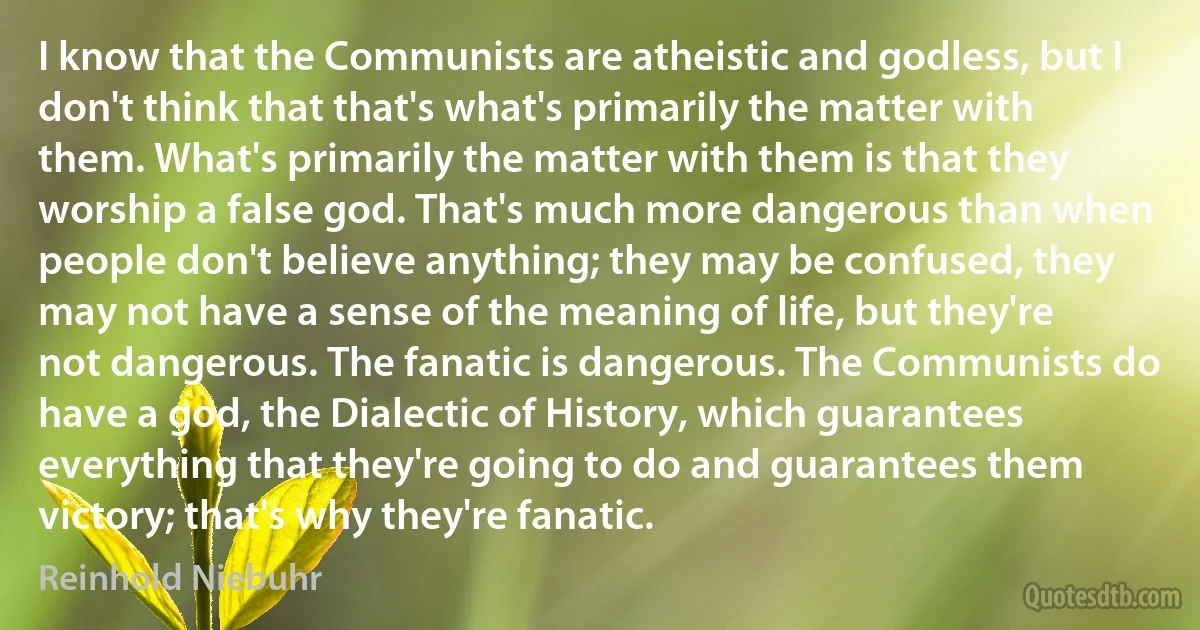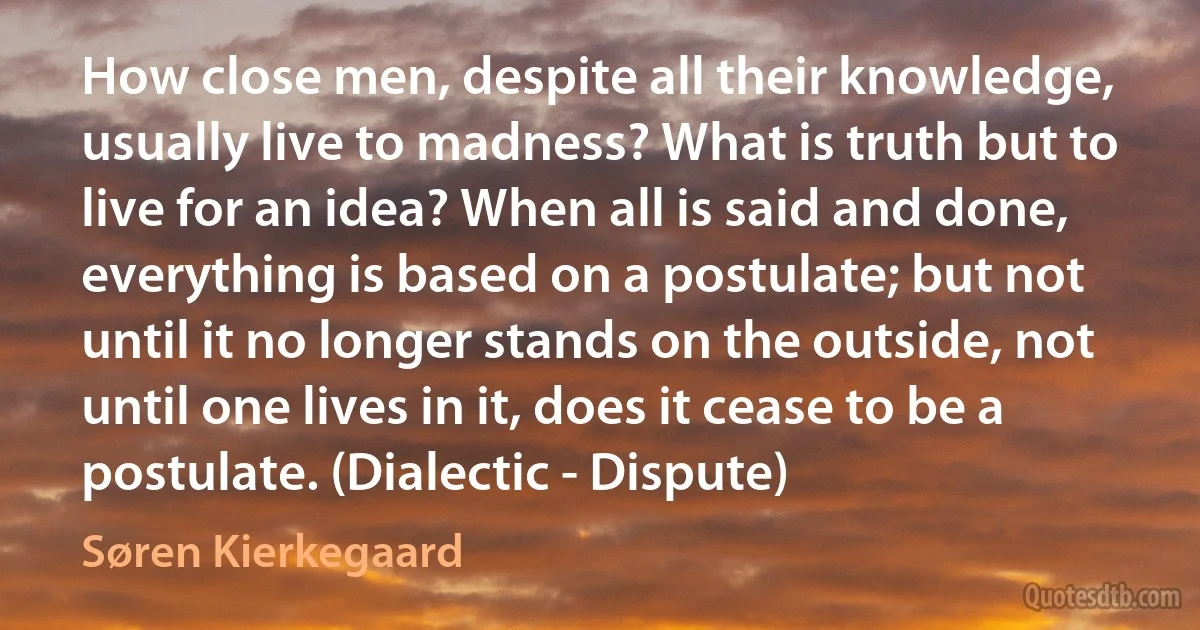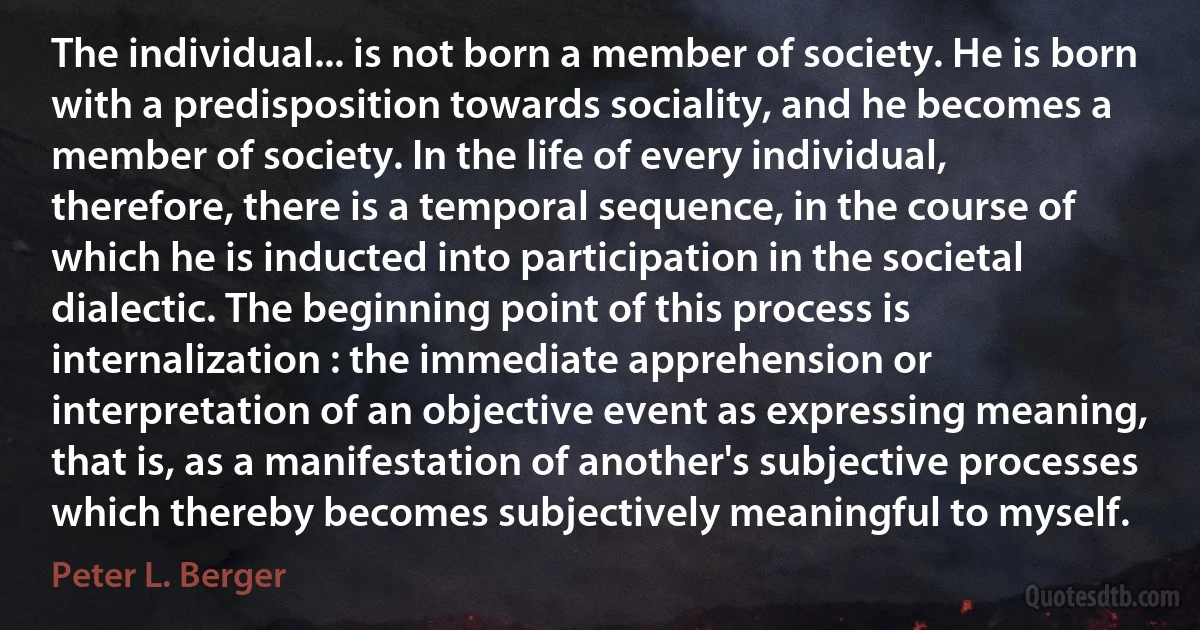Dialectic Quotes - page 2
The halo around the heads of Plato and Socrates is now gone. He sees that they consistently are doing exactly that which they accuse the Sophists of doing-using emotionally persuasive language for the ulterior purpose of making the weaker argument, the case for dialectic, appear the stronger. We always condemn most in others, he thought, that which we most fear in ourselves.

Robert M. Pirsig
In his attempt to unite the Good and the True by making the Good the highest Idea of all, Plato is nevertheless usurping aretês place with dialectically determined truth. Once the Good has been contained as a dialectical idea it is no trouble for another philosopher to come along and show by dialectical methods that aretê, the Good, can be more advantageously demoted to a lower position within a "true" order of things, more compatible with the inner workings of dialectic. Such a philosopher was not long in coming. His name was Aristotle.

Robert M. Pirsig
But it seems that something has happened that has never happened before: though we know not just when, or why, or how, or where.
Men have left GOD not for other gods, they say, but for no God; and this has never happened before
That men both deny gods and worship gods, professing first Reason,
And then Money, and Power, and what they call Life, or Race, or Dialectic.

T. S. Eliot
In the Platonic dialectic, ... the terms "Being” "Non-being” "Movement,” "the One and the Many” "Identity” and "Contradiction” are methodically kept open, ambiguous, not fully defined. They have an open horizon, an entire universe of meaning which is gradually structured in the process of communication itself, but which is never closed. The propositions are submitted, developed, and tested in a dialogue, in which the partner is led to question the normally unquestioned universe of experience and speech, and to enter a new dimension of discourse - otherwise he is free and the discourse is addressed to his freedom. He is supposed to go beyond that which is given to him - as the speaker, in his proposition, goes beyond the initial setting of the terms. These terms have many meanings because the conditions to which they refer have many sides, implications, and effects which cannot be insulated and stabilized.

Herbert Marcuse
For millennia, the dialectic of vilification and deification and, more generally, of invalidation and validation-excluding the individual from the group as an evil outsider or including him in it as a member in good standing-was cast in the imagery and rhetoric of magic and religion. ... With the decline of the religious world view and the ascent of the scientific method during the Renaissance and the Enlightenment, the religious rhetoric of validation and invalidation was gradually replaced by the scientific. One of the most dramatic results of this transformation is the lexicon of psychiatric diagnoses functioning as a powerful, but largely unacknowledged, rhetoric of rejection and stigmatization.

Thomas Szasz
The secret of Hegel's dialectic lies ultimately in this alone, that it negates theology through philosophy in order then to negate philosophy through theology. Both the beginning and the end are constituted by theology; philosophy stands in the middle as the negation of the first positedness, but the negation of the negation is again theology. At first everything is overthrown, but then everything is reinstated in its old place, as in Descartes. The Hegelian philosophy is the last grand attempt to restore a lost and defunct Christianity through philosophy, and, of course, as is characteristic of the modern era, by identifying the negation of Christianity with Christianity itself.

Ludwig Andreas Feuerbach
Writings are naturally accessible to all who can read. Therefore a philosopher who chose the second way could expound only such opinions as were suitable for the nonphilosophic majority: all of his writings would have to be, strictly speaking, exoteric. These opinions would not be in all respects consonant with truth. Being a philosopher, that is, hating "the lie in the soul" more than anything else, he would not deceive himself about the fact that such opinions are merely "likely tales," or "noble lies," or "probable opinions," and would leave it to his philosophic readers to disentangle the truth from its poetic or dialectic presentation. But he would defeat his purpose if he indicated clearly which of his statements expressed a noble lie, and which the still more noble truth.

Leo Strauss
..."progress”, in poetry at least, comes not so much from digesting the last age as from rejecting it altogether (or, rather, from eating a little and leaving a lot), and...the world's dialectic is a sort of neo-Hegelian one in which one progresses not by resolving contradictions but by ignoring them.

Randall Jarrell
But now, in this century of ideologies, the Gods and Destiny have been given new life. "Miracles in the world are many," Sophocles wrote in the fifth century BC. "There is no greater miracle than man." Suddenly, at the end of the twentieth century, we discover that no, after all, it isn't true. Historical inevitability is a greater miracle than man. As is the dialectic. As is the superiority of various groups according to blood type. As is the genius of an abstract mechanism called the market. As is the leadership of inanimate objects - called technology - which worker bees create and then, inevitably, are led by. These inevitabilities are great leaps backward into the arms of the Gods and Destiny.

John Ralston Saul
Feuerbach is the only one who has a serious, critical attitude to the Hegelian dialectic and who has made genuine discoveries in this field. He is in fact the true conqueror of the old philosophy. The extent of his achievement, and the unpretentious simplicity with which he, Feuerbach, gives it to the world, stand in striking contrast to the opposite attitude (of the others). Feuerbach's great achievement is: (1) The proof that philosophy is nothing else but religion rendered into thought and expounded by thought, i.e., another form and manner of existence of the estrangement of the essence of man; hence equally to be condemned;(2) The establishment of true materialism and of real science, by making the social relationship of "man to man” the basic principle of the theory; (3) His opposing of the negation of the negation, which claims to be the absolute positive, the self-supporting positive, positively based on itself.

Karl Marx
Man is biologically predestined to construct and to inhabit a world with others. This world becomes for him the dominant and definite reality. Its limits are set by nature, but, once constructed, this world acts back upon nature. In the dialectic between nature and the socially constructed world the human organism itself is transformed. In this same dialectic man produces reality and thereby produces himself.

Peter L. Berger
Let us summarize these three points more concisely:
(a) The rejection of art as a mere emotional, individualistic, and romantic affair.
(b) 'Objective' work, undertaken with the silent hope that the end product will nevertheless eventually be regarded as a work of art.
(c) Consciously goal-directed work in architecture, which will have a concise artistic effect on the basis of well-preparated objective-scientific criteria.
Such an architecture will actively raise the general standard of living. This represents the dialectic of our development process, which purports to arrive at the affirmative by negation - a process similar to melting down old iron and forging it into new steel.

El Lissitsky



